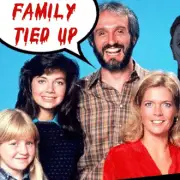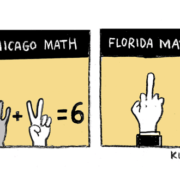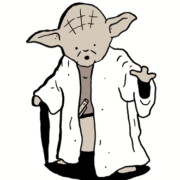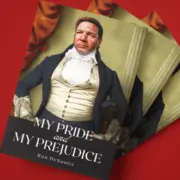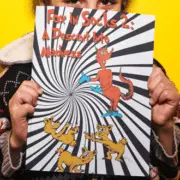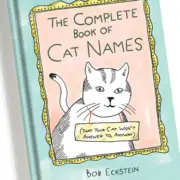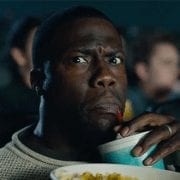Whimsical, Feel-Good Alternatives to Some Stephen King Classics
Carry
Blanch is not a popular girl. See, Blanch has an imaginary friend she talks to whenever the impulse takes her: a pet rock she calls Carry.
Blanch carries Carry everywhere she goes. She sets Carry on her desk at school, reserves a place for Carry on the seat next to her on the bus. Carry accompanies Blanch to the soup kitchen where Blanch volunteers after school. At the soup kitchen Carry sits in a hard-boiled egg container by the big pot of soup, grinning eternally away.
Steadfast in her belief that Carry is as real as any person, Blanch begins to garner sympathy, and then interest, instead of ridicule. Classmates begin talking to their own imaginary friends: other pet rocks, pet sticks, pet gobs-of-gum from under desks, from the soles of shoes. Even Blanch’s teacher, Mrs. Desjardins, brings a potted plant from home and begins each day by reciting “I Wandered Lonely as a Cloud” to her floral friend named Daffodil.
A true inspiration, Carry teaches us all about the power (certainly not the danger) of unwavering belief.
Pet Sanctuary
Life of Pets meets The Chimps of Fauna Sanctuary.
Evolution is alive and well in this fable-ish little tale featuring Bobo and Macaque, two ne’er-do-well simian beaus who get into a tumble (wink, wink) of mischief when the lights go out.
Bordering on the salacious, this slinky little number might be the one to keep you up past your bedtime.
You naughty little monkey you.
Sale: Em’s Lot
The hot, dusty summer of 1979 ends and Dorothy (a tired fifty-six-year-old cobbler) can’t take it anymore. “That’s it,” she declares to her old dog, Otto, “we’re moving north.”
That night she dreams of skating on frozen ponds, sliding down snow-whitened hills, the whimsy of snow-angels, the unadulterated joy of a white Christmas.
When Dorothy wakes to a stormy morning she battens down the hatches and drives the For-Sale sign determinedly into the hardened ground. Just as she’s about to hole up for the storm, Dorothy trips on the front step and knocks herself cold.
Here the story takes a colourful turn: in what seems like another reality Dorothy disembarks from The Polar Express and finds herself in a strange and wonderful wintery land called frOZe. As she looks around, her voice quivers gleefully in the cold: “Oh, Otto. I have a feeling we’re not in Kansas anymore.”
And, oh, Otto, the magic that awaits us between the covers of Sale: Em’s Lot.
The Dad Zone (translated from the French classic, La Zone Papa)
Lonely, looking-for-love Jean Lefèvre lives in Château Roche where he teaches high school business and dresses like an accountant who lives in an apartment without wi-fi or windows.
Down the hall lives the whimsically beautiful Sara Braque de Nelle. Sara, to note, dates musicians exclusively and winks at everyone she passes.
The first time she winks at Jean he falls in love.
In an elaborate plan to win her heart, Jean makes a few quick calls to get the old band back together. “American Idol: the Rock Band Edition” is coming to town and, swift as he is, Jean spies his chance.
One for the underdogs, The Dad Zone builds to a nail-biting sing-off finale between The Dad Zone (the eponymous motley crew of ragtag middle-aged fat balding dads, led by Jean himself) and Meh (a group of highly trained, super-talented teenagers led by Guy Le Guy who—coincidentally?—might be Jean’s estranged-from-birth son).
Will Jean win Sara’s heart? Will Guy and Jean discover their connection in some implausible plot twist? Or will The Dad Zone flop so gloriously we won’t know whether to laugh or cry?
When it comes time to cast your vote, Idol fans, vote The Dad Zone.
A Well-Lighted Place
Not set in or about a dark tower.
Or a waste land.
And not to be confused with the Hemingway title.
This roman a clef tells the story of how Stephen King himself (known here as Prince) comes to be—above all others (except maybe that Brit, Robert Galbraith)—the one person any semi-literate avatar among us identifies when tasked with naming the most famous writer of all time.
Chapter 1 opens at a respectable hour at a respectable café in a respectable Paris. Prince and two other up-and-coming writers–Thomas Stearns and Poppa H–sip their whiskey neat. They discuss the craft, the word, the source, the point of it all. Quotable quotes abound.
Chapter 2 opens at three in the morning with Oscar Wilde (late to the party and playing himself), standing aloof and at a protected distance from our writer-friends who have since passed out in the rain. Clutching his lapels, Mr. Wilde drolly states: “Three of us seem to be in the gutter, and one of us is a star.”
“Oh, Oscar,” says Prince, coming to. “Not so fast.”
Chapter 3 opens with Prince at his typewriter smoking cigarette after cigarette and slurping down pots of black coffee.
By chapter 87 we discover Prince has been our narrator the whole time, and on the last page when he tasks his friends with naming the most famous writer of all time, we already know the answer and we’re happy to see it writ on the page.
11/10/69
An intricately crafted unraveling of how Big Bird comes to make his/her television debut.
L. Moe, one the world’s preeminent ornithologists, writes: “The Big Bird story is to birders what the JFK story is to American history enthusiasts: gripping, essential, rife with mystery. From one watcher to another, we’re in the company of a rare sighting indeed.”
- About the Author
- Latest Posts
Daryl Sneath was born in a small town by a lake. His two novels are All My Sins and As the Current Pulls the Fallen Under. He now lives in another small town by a river with his wife, Tara, and their three children Ethan, Penelope, and Abigael.





